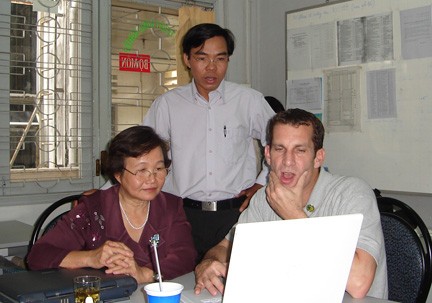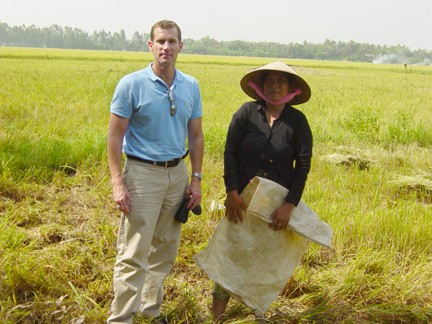Cary Trexler
In 2007, Cary Trexler, an assistant professor and expert on agriculture education, was awarded a prestigious Fulbright fellowship to extend his research and outreach in Vietnam. “Ultimately, all of this work has the potential to move the School of Education beyond a focus on secondary schools to opportunities for education policy and administration,” said Trexler. “It is potentially an opportunity to understand and participate in a restructuring of an entire educational system.”
In the context of a campus effort initiated by former Chancellor Larry Vanderhoef to “turn boundaries into bridges,” Cary Trexler, professor of agriculture education, is engaged with educators, farmers, and students in Vietnam.
With 30 years between this generation and the end of the Vietnam War, Trexler is taking action on what scholars have always known to be true—we have much to offer each other. Trexler sees immense potential for collaboration, mutual learning and a deeper fulfillment of the UC Davis service mission.
In 2004, Trexler made his first visit to Vietnam. In 2006, he returned to continue work with agriculture education faculty from Nong Lam University in Ho Chi Mienh City. Together they toured economically depressed areas of the country to identify where education and extension are most needed.
According to Trexler, the need for a comprehensive agriculture education program is great in Vietnam. Today, for instance, the country is heavily dependent on rice production, but its methods for farming rice (a low value crop) requires large amounts of pesticides and fertilizers. In the process, the country’s farmers are polluting its most valuable resource, water, at an alarming rate.
Trexler’s work with the faculty at Nong Lam will lead to that university’s reconstituting a comprehensive agriculture education program, with a focus on training high school teachers. Trexler returned in 2007 to continue planning for the curriculum.
In addition to his work with Nong Lam University, Trexler is committed to an effort to internationalize UC Davis’s agriculture education curriculum through work with Can Tho University in Vietnam. An agreement between the two universities calls for collaborative research and extension programs on post-harvest fruit and vegetable handling and community development, and a greater emphasis for UC Davis on service-learning through a new study abroad program.
By helping the Vietnamese learn more about post harvest handling of the immense variety of fruit and vegetables they produce, UC Davis can help move farmers in this developing country away from a focus on rice to higher yield crop production, according to Trexler.
Jointly the partners—including faculty from UC Riverside, the UC Davis International Programs Office in the College of Agricultural and Environmental Sciences and UC Cooperative Extension farm advisors—will design and implement a research, teaching, and extension program that uses a village in the Mekong Delta as a context for the work.
Trexler is also active in campus efforts to partner with leaders in the Mekong Delta to increase the educational level of its people. As part of a Vietnamese initiative, Mekong 1000, UC Davis joined nine other universities from across the globe (Michigan State was the only other U.S. university) to sign an agreement in November pledging to accept 100 post graduates each from Vietnam.
In September 2006, Trexler also traveled to China with Bill Lacy, Vice Provost of the Office of Outreach and International Programs, to attend a conference focused on “Strengthening the Service Mission of Universities and Research Institutions for Sustainable Global Development.”
“Ultimately, all of this work has the potential to move the School of Education beyond a focus on secondary schools to opportunities for education policy and administration,” said Trexler. “It is potentially an opportunity to understand and participate in a restructuring of an entire educational system.”










